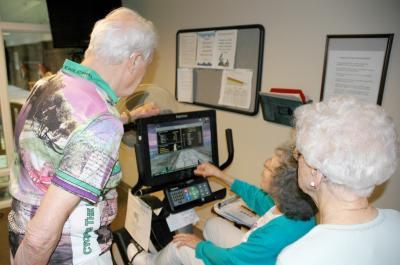'Exergames' May Provide Mental Benefit for Older Adults

A new study suggests that virtual reality enhanced exercise, or ‘exergames’ in interactive video gaming provides greater cognitive benefit for older adults than traditional exercise alone.
"We found that for older adults, virtual-reality enhanced interactive exercise, or 'cybercycling' two to three times per week for 3 months, yielded greater cognitive benefit, and perhaps added protection against mild cognitive impairment (MCI), than a similar dose of traditional exercise," says lead investigator Cay Anderson-Hanley, PhD from the Healthy Aging and Neuropsychology Lab and Department of Psychology at Union College, Schenectady, NY. The study was published in the American Journal of Preventive Medicine.
While previous research shows that exercise may prevent or delay dementia and improve cognitive functioning in normal aging, only 14 percent of adults aged 65-74 years old, and only 7 percent of those over 75 report regular exercise.
The games, on the other hand, have the potential to increase exercise by shifting attention from aversive aspects toward motivating features such as competition and three-dimensional scenery, explained the researchers.
They were found to lead to great frequency and intensity and enhanced health outcomes in older adults.
Enrolling 101 volunteers, ranging in age from 58 to 99 years, from independent living facilities with indoor access to an exercise bike, 79 participants of the Cybercycle study completed initial evaluations and training, and rode identical recumbent stationary bikes, except the experimental bike was equipped with a virtual reality display.
The authors explained that Cybercycle patients experienced 3D rides and raced against a "ghost rider."
Averaging 3 rides per week, 63 adults completed the study.
The study found that the cybercycle riders had significantly better executive function than those who rode a traditional stationary bike, 1 and 3 months later.
Researchers evaluated executive functions such as planning, working memory, attention, and problem solving.
Cybercyclists experienced a 23 percent decrease in progression to mild cognitive impairment compared to traditional exercisers.
"No difference in exercise frequency, intensity, or duration was found between the two groups, indicating that factors other than effort and fitness were responsible for the cognitive benefit,” said co-principal investigator on the project, Paul Arciero, PhD, professor of health and exercise sciences at Skidmore College.
"Navigating a 3D landscape, anticipating turns, and competing with others require additional focus, expanded divided attention, and enhanced decision making. These activities depend in part on executive function, which was significantly affected," said Dr. Anderson-Hanley.
Researchers also found a significant increase in brain-derived neurotrophic factor, BDNF, which is defined as an act on certain neurons of the central nervous system and the peripheral nervous system to help support the survival of existing neurons and encourage the growth of new neurons and synapses, in cybercyclist than traditional riders.
"Further research will be needed to tease apart the contributions of a variety of factors in the cybercycling condition," said Anderson-Hanley.
"Consistency across conditions for goal setting and competition suggests virtual reality imagery and interactive decision-making might be potent factors of the cybercycle."
"The implication of our study is that older adults who choose exergaming with interactive physical and cognitive exercise over traditional exercise may garner added cognitive benefit, and perhaps prevent decline, all for the same exercise effort."
Published by Medicaldaily.com



























